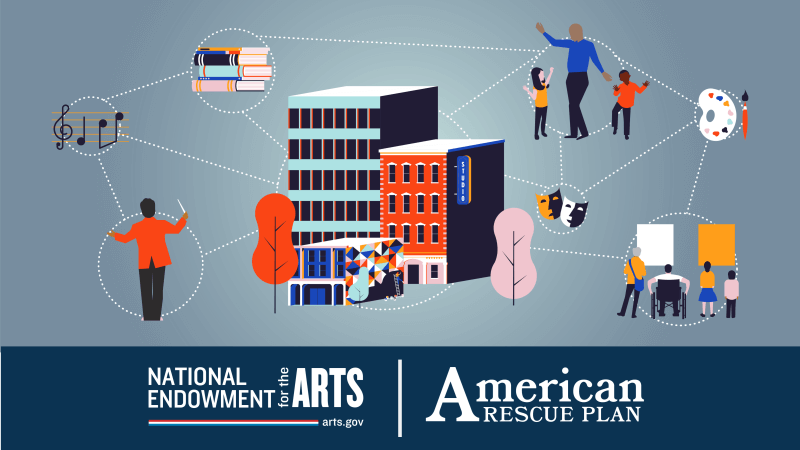NPN and 17 Partner Organizations Awarded American Rescue Plan Funding
February 23, 2022 • 4 minute read

The National Endowment for the Arts (NEA) recently announced $57.75 million in direct grants to 567 arts organizations, including awards to the National Performance Network and 17 of its member organizations, totaling $1,950,000. The awards represent the third and final round of funding through the historic American Rescue Plan (ARP), signed into law in March 2021, with $135 million provided to the NEA to help the arts and cultural sector recover from the pandemic. These most recent grants were awarded in the amounts of $50,000, $100,000, and $150,000, and intended to support employment of staff and artists, operations and facilities costs, health and safety supplies, and marketing and promotional expenses.
“Our nation’s arts sector has been among the hardest hit by the COVID-19 pandemic. The National Endowment for the Arts’ American Rescue Plan funding will help arts organizations rebuild and reopen,” said NEA Chair Dr. Maria Rosario Jackson. “The arts are crucial in helping America’s communities heal, unite, and inspire, as well as essential to our nation’s economic recovery.” These latest grants follow two other rounds of ARP funds: the first, in April 2021, awarded $52 million to 62 state, jurisdictional, and regional arts organizations; the second, in November 2021, awarded $20.2 million to 66 local arts agencies for subgranting to local artists and art organizations.
The National Performance Network is honored to have been awarded an NEA American Rescue Plan grant of $100,000 over two years. Likewise, we celebrate the 17 NPN member organizations that, collectively, will receive $1,850,000 in ARP funding: the Arab American National Museum, Asian Arts Initiative, Bates Dance Festival, Dance Place, DiverseWorks, Flynn Center for the Performing Arts, GALA Hispanic Theater, Highways Performance Space, Los Angeles Contemporary Exhibitions, Painted Bride Art Center, Pangea World Theater, Pregones Puerto Rican Traveling Theater, Space One Eleven, Su Teatro, The Theater Offensive, Wexner Center for the Arts, and The Yard.
NPN’s American Rescue Plan funding will be used exclusively for artists’ fees, as was NPN’s funding from the CARES program in 2020. “Over the last two years, we have deepened our work toward economic justice for artists, reimagining new practices for the arts-presenting field that build artists’ power and address poor wage and labor conditions for artists, particularly for artists of color, trans artists, and artists with disabilities,” says NPN President and CEO Caitlin Strokosch. “These funds are especially critical as we shift from emergency relief to recovery and systems change. Support from the NEA’s American Rescue Plan will go toward projects between artists and presenters that experiment and model these values, rooted in equity, reciprocity, transparency, and shared risk, so that we can build a more just and sustainable future for artists and our field.”
The Arab American National Museum will use funding to reinstitute their facility-use program after a nearly two-year reprieve from in-person programming. “The program is particularly important to re-establishing traction with people in our immediate neighborhoods, many of whom are low-income immigrants and refugees who have spent the last 20+ months sheltered in place, and have faced grave social, physical, and mental health impacts due to COVID-19,” a museum representative shared. At Dance Place, funds will directly support four positions, allowing for more sustainable salaries in positions that keep the organization running smoothly so they are better equipped to support artists and their communities.
In planning the rollout of ARP funds this year, the NEA encouraged applications from organizations serving communities traditionally underserved by the government, those applying for federal support from the NEA for the first time, and diversity with respect to geography and budget size. The NEA also lifted its customary matching-funds requirement (as it did with CARES funds in 2020), enabling smaller-budget arts organizations in particular to apply for these critical funds. Between the NEA’s outreach efforts and the continued economic crisis facing the nonprofit arts sector, the agency received more than 7,500 applications requesting nearly $700 million in support. Among the organizations awarded funding, 27% are first-time NEA grantees and 78% are small or mid-sized organizations with budgets of less than $2 million. Grantees are located in urban, rural, and tribal communities in all 50 states, Puerto Rico, the US Virgin Islands, and Washington, DC; and represent all 15 of the NEA’s artistic disciplines.
While the scale of ARP funds is unprecedented, the NEA has experience in relief efforts. In 2020, the NEA awarded $70 million through the Coronavirus Aid, Relief, and Economic Security (CARES) Act. As part of the American Recovery and Reinvestment Act of 2009, Congress appropriated $50 million to the NEA to support the preservation of over 7,000 jobs in the nonprofit arts sector; the agency awarded its grant funds in 20 weeks, using less than one percent of its allocation to cover increased administrative costs, and was the first federal agency to get all its money out the door. In addition to these sweeping national efforts, the NEA has also provided recovery support for localized crises—from hosting the design process for a memorial following the 1995 Oklahoma City bombing to emergency funding in Puerto Rico following hurricanes Maria and Irma in 2017.
For more information on the NEA’s American Rescue Plan grants, including the full list of arts organizations funded in this announcement, visit www.arts.gov/COVID-19/the-american-rescue-plan.